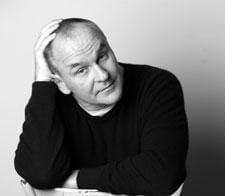Like many artists,Daniel MacIvor describes his art as an entity unto itself.
Though his plays realistically illuminate the inner workings of the human condition they also denote utopian elements in their themes — themes that unapologetically magnify and unabashedly deliver a reprieve from the confines of social and sexual conformity.
“My plays are more evolved than I am,” the queer playwright and actor says. “I wish I could be as evolved as my plays are in terms of what they say.”
MacIvor, who splits his time between homes in Halifax and Toronto, has numerous writing, acting and directing credits under his belt, including winning the Governor General Award for Drama in 2006.
A Beautiful View, being staged in Vancouver this month, examines the line between lesbian love and friendship and how such friendship is navigated within the rigid confines of labels.
The play centres around two women, each mistaking the other for a lesbian, both believing they are being seduced by the other and neither wanting to be the seducer because that would mean they are something other than the heterosexuals they — and others — believe them to be.
The point the play tries to make, says MacIvor, is what makes a lesbian.
“I wondered what it would be like for two heterosexual women to fall in love and how they would deal with those [labels]?”
That question permeates the core of the play. The two women become so entrenched in adherering to their socially ascribed identities that they inevitably lose out on potential happiness and love.
MacIvor says inspiration for the play came from the younger generation. “I noticed that the kids have developed this sort of polyamorousness with this sort of refusal to labels,” he says. “I started seeing this kind of shooing of labels among the youth.”
MacIvor ran with the idea. “A label is just a label no matter what it is,” he says.
“I like to choose my labels very carefully,” he reflects. “I would say Cape Bretoner, I’ll take that one. I’ll take writer; I’ll take Cancer -Leo cusp,” he quips.
“I’ll take a lot of things before I take gay,” he admits.
“I identify as queer,” he explains. “I don’t identify as gay because queer just feels a little bit more inclusive.”
To the naked eye MacIvor’s play might point to women fighting their deep-seeded lesbian desires, but MacIvor goes further and deeper, illuminating the hold labels have on people and how those labels can hinder the potential for cultivating sexually satisfying and mutually loving relationships —regardless of one’s sexual preferences.
“This idea of how to identify sexually, and what the sex means, freaks them out. It creates a sort of wall in the relationship. It’s the idea that the line was crossed, that the sex had happened,” he says.
“It starts as a conversation of who we are and for all intents and purposes they are a couple,” he says. “They behave like a couple. They spend all their time together. They have sex.
“They had sex and it was good sex and why can’t they have sex again?” he asks. “They can’t have sex again because it would mean they would have to make some sort of commitment to something politically, or a statement or a label,” he answers. “They would have to become something.”
Colleen Wheeler, who plays Linda, says MacIvor really understands the complexities of gender and relationships. “He has this uncanny ability to write for women.”
The play takes both women on a journey, she says, adding that they both end up seeing the “best parts of themselves in each other.”
It is this notion of the self through the reflection of others that MacIvor drives home in his play.
“It’s about love,” Wheeler says succinctly.
“It is the essence of what human relationships and dynamics are all about,” adds Diane Brown, who plays Linda’s reluctant love interest and whose production company, Ruby Slippers, is producing the play.
And while MacIvor says being human inherently makes him political, he maintains his work is not that cut and dry. “It goes beyond the political and it goes more into the philosophical, metaphysical, yada, yada, yada,” he says.
“It is where you really take a step back from something [and] you realize a label is just a label of a label of a label of a label of a label and none of it means anything.
“When we’re doing something in order to create an image of ourselves or try to control the way other people think of us, that’s when we’re going to be screwed,” he says.
“We’re trying to create an image of a self that doesn’t even exist and it keeps us out of living in the moment,” he continues. “Just be where you are right now.”

 Why you can trust Xtra
Why you can trust Xtra


